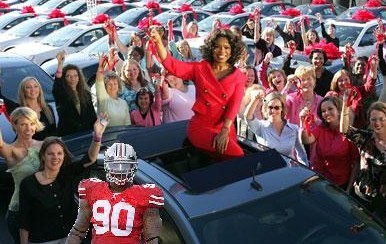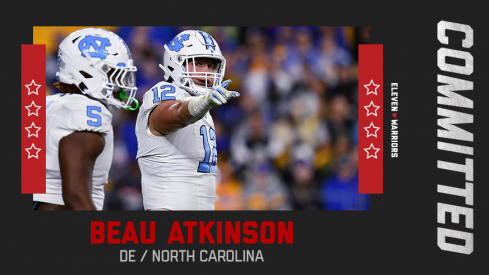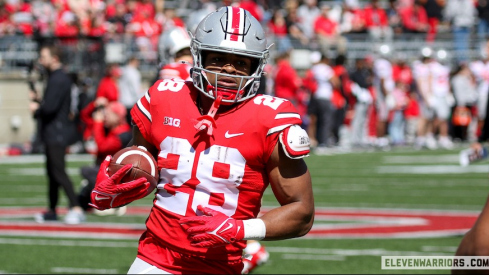 Zero down, zero a month with zero financing. Zero possibility.
Zero down, zero a month with zero financing. Zero possibility.Welcome to Cargate! It's a clever little sequel to Tatgate, except that not all of the stars from the original blockbuster returned for part two. So basically it's Speed 2: Cruise Control. Draw your own box office parallel.
We've heard the stories for awhile about how Ohio State football players - most notably Terrelle Pryor - had acquired vehicles from the same salesman, a guy named Aaron Kniffin. That story, which grew wings once Tatgate broke in December quickly dissolved once OSU Compliance ruled in January following an internal investigation that nothing improper had occurred.
Fast-forward four months to Saturday when the Columbus Dispatch published its own investigation of the transactions between Kniffin and dozens of Ohio State athletes and their relatives along with the news that OSU Compliance was going to re-examine the already-vetted car deals. So this is actually a sequel to the original, short-lived Cargate. A sequel no one really wanted. Just like Speed 2.
Mere hours after the Dispatch story broke, ESPN also made it a front page story. For those of you playing the ESPN Selectively Newsworthiness Home Game, Cargate II was acknowledged exactly two years, eight months, 11 days and several hours faster than the Reggie Bush investigation was. And it seemed even faster than that because in the Big Ten everything moves too fast for us hurrrrrrrrrr...
Critical analysis of the latest chapter in Ohio State's ongoing offseason shitshow was swift: From Georgia to Michigan the pre-investigation verdict was GUILTY GUILTY GUILTY. Outside of Ohio, Americans were united and celebrating the latest Ohio State report as if the Navy had figured out a way to bring Osama back to life so that they could kill him again, repeatedly. Haters hate. That's why they're called that.
For those of us who are fans of the home team, just reading the headline, "Ohio State to investigate players' car deals" was like taking 100 laxatives. However, there were several important details within the article, like:
NCAA rules don't prohibit athletes from shopping at the same stores, eating at the same restaurants or buying cars at the same dealerships. The rules prohibit athletes and their relatives from receiving discounts that are not offered to the general public.
Compliance was not as concerned if the player sucked at negotiating, nor if the player cut a sweet deal, but if he got a deal that no one else could have gotten. Coercing Kniffin to "go and talk to his manager to see what he can do" is not an NCAA violation. Any one of us in the general public who push hard enough can get this treatment. [Side note/consumer tip: This meeting is a charade designed to make you feel special and get your business. Congratulations, you've just unlocked the Everyone Gets It discount.]
Since Cargate is not a new story, the Dispatch report was full of numerous re-hashed items that - nonetheless - raise ze eyebrows off of ze face, like Pryor's repeated use of loaner cars that OSU Compliance claims to have cleared. This is the same unit that actively looked through Tressel's emails after Tatgate was "closed," discovered his coverup, and reported it. The people for whom that is not good enough are the same people who could never be satisfied with any level of self-policing at Ohio State.
Based on the fact that this is all being re-examined, it appears that there are some questions as to if OSU Compliance checked each vehicle, or if it merely "checked" each vehicle. If it's found that upon further review that the first checks missed items big and obvious, then Ohio State and especially its compliance department deserve to be filleted. That would be unpleasant, so hopefully the second investigation will match the first.
The Dispatch learned that as many as 50 Ohio State-ish people just happened to do business with Kniffin over the past six years, and that each of those transactions should result in a phone call to OSU Compliance to discuss the terms before they're finalized. Additionally, all of the cars were used, American and sold for an average of less than $12,000 which puts this sample size solidly in the realm of "typical college student vehicle." None of those details were suspicious. If anything, they were comforting. College students are supposed to drive modest second-hand cars.
All told, there were only two WTF moments in the entire report. This was the first one:
Officials at two national car-valuation companies...were asked by The Dispatch to estimate the value of the cars at the time of purchase. The values they estimated were higher than the price paid in nearly half of the transactions.
...which means that the majority Ohio State players and affiliates paid more for their used cars than they were worth. On a macro level this says there is nothing to see here. Some buyers haggle until they get a deal that's still within the dealer's acceptable margin while others quit negotiating too soon and end up overpaying. Wow, Ohio State athletes and their families are getting treated just like everyone else. That's what OSU Compliance had already determined.
It is revealing that the Dispatch worded this vitally important information in this manner; it's sort of like saying that Tim Tebow failed to win the Heisman Trophy in 75% of his eligible seasons. Well yeah, that's true. The Dispatch could have also easily said, "records show that most of the buyers paid more than the car was worth" instead, but this passage was framed to make the case for guilt instead of innocence. When it rains, etc. So why is this a story at all?
Here's the second - and signature - WTF moment:
Public records show that in 2009, a 2-year-old Chrysler 300 with less than 20,000 miles was titled to then-sophomore linebacker Thaddeus Gibson. Documents show the purchase price as $0.
Oh. That's why.
You want a red flag; you've got your red flag: Gibson responded to the report by telling the Dispatch that he paid for and is still paying for the car, while the Kniffin told WTVN that the paperwork showed a price of $0 because it was a refinancing situation. These claims should be very easy to prove or disprove. The timing of those payments would be important as well (like, if Gibson began paying for the car right around 11am EDT last Saturday morning). So that zero should summarily be explained, but even when it is there is no way a car dealership just gave away a car.
Dealers may use creative financing to help execute sales, but they don't just unload free vehicles. Only Oprah does that, and when she does, she does so at full book value which means all of the winners get a nice tax bill. Also note that "future NFL earnings" is a non-starter and impermissible collateral for a car purchase as far as the NCAA is concerned, since the rules prohibit athletes and their relatives from receiving discounts that are not offered to the general public. The general public cannot bank future NFL earnings, therefore neither can college athletes.
Two former NCAA enforcement officers anonymously told the Dispatch that there was cause for concern. There are exactly two causes for concern in the article as far as I'm concerned: One, obviously Gibson's $0 car. Two, the fact that four of the Tatgate players also bought cars: That they were willing to part with trinkets at the tattoo parlor is precedent enough to be suspicious at the dealership or anywhere else. It's circumstantial at best, but unfortunately Ohio State has earned the burden of circumstantial evidence being fishy enough to stink.
There's another explanation that the Dispatch ignored, and it was one that was summarily dismissed by the initial blogger outrage once the news broke on Saturday: That Kniffin managed referrals very well. I can speak to this out of personal sales experience, having sold annuities, insurance and other investments for eight glorious, 100% commission months after college. My first couple of clients were Chicago area doctors.
Why did I deliberately pursue doctors? Because they tend to have a lot of money and suck at doing productive things with it (note to any doctors reading this - please don't be offended; I'm talking about other doctors, not you).
By the time I decided a life of kitchen table sales negotiations wasn't for me and I turned in my clip-on tie, over 90% of my clientele had M.D. printed somewhere on their business cards and lived in either Illinois, Indiana or Wisconsin. That's because doctors know other doctors, and salesmen work almost exclusively on referrals.
Yes, it would be much easier to just sit at a phone and take orders, but salespeople aren't required for products that generate sales like that, so you're forced to ask your customers for referrals. Kniffin, as well as every other competent used car salesperson in the country, does this as a standard practice.
Similarly, football players know other football players. And they in turn know their own parents. This is the essence of sales. You wrinkle your nose but it's entirely plausible and the burden of proof that this wasn't the case would require prima facie evidence to the contrary. The Dispatch investigation uncovered nothing of the sort.
It's equally important to understand the principles of auto sales in particular: Kniffin was a salesman representing a dealership. Car salesmen do not have the authority to dictate price. Sure, they can try to sell a beater to some rich idiot for five times the book value, but no dealership is going to allow the local football team and their friends to routinely buy their cars at a loss; that's terrible for business.
Gibson - or any other NFL athlete for that matter - would never become a golden goose that referred future fellow millionaires in Kniffin's direction to buy used cars. At best, he'd refer more teammates to Kniffin, but this was a customer pipeline that Kniffin already had prior to Gibson's "purchase." In all of those respects, there is just no way that Gibson drove out of the dealership without paying for anything.
Outside of Gibson's paperwork, there isn't any evidence from what's been reported thus far that should have previously turned any heads in Doug Archie's office. In the eyes of the NCAA, the most nefarious thing a car dealership has done recently was to employ Oklahoma's starting quarterback and pay him even though he didn't do any work. Jobs are monitored as closely as ever. You actually have to show up to get paid. If anything comes from Cargate, it should be from Pryor's documented jones for loaner vehicles. That is the only thing from the Dispatch reporting that has the potential to stink, and it's old news.
Fortunately, Cargate does not include new or luxury vehicles. When Steve Bellisari was pulled over for drunk driving in 2001 there were three words that leapt off of the police report: Used. Pontiac. Sunfire. In strife, those three words brought relief. (Note to any used Pontiac Sunfire owners reading this - please don't be offended. Your car may be a discontinued piece of shit, but that's no reflection on you personally. You're awesome, if only for not getting a DUI and missing the Michigan game).
It's not just Ohio State that checks every athlete's vehicle transactions to make sure they pass the sniff test: Michigan compliance began doing the same thing after Robert Traylor flipped an SUV and nearly killed Mateen Cleaves during a recruiting visit. After the accident, compliance officials thought it was odd that Traylor would be driving such a nice car so they looked into the paperwork and discovered it was registered to one of Traylor's relatives.
It turned out the SUV had been acquired through the late Ed Martin, who was the primary bankroller implicated in the scandal that effectively destroyed Michigan basketball for over a decade. That accident in that vehicle started Michigan's unraveling. You look out for cars and cash. Burritos and discounted tats are a little harder to find, especially if your coach is covering it up.
Just as car dealers gain nothing by giving away margins and product, compliance officials have absolutely nothing to gain by looking in the other direction. Actually, they have everything to lose. There is an element of self-preservation that comes with any job, especially that of a compliance department official. Universities don't keep ineffective compliance officials on their payrolls, and OSU Compliance has a very long track record of not ignoring anything.
OSU practically overreports violations, including infractions as silly as hockey players sneaking into a Nickelback concert (side note: Ugh) and a woman's soccer player greeting boosters at a university dinner program (side note: "Greeting" is code for "saying hello"). They investigate and report their asses off. There is no lacking of institutional control as far as OSU Compliance's track record is concerned.
As far as the list of real and perceived Buckeye infractions is concerned, the Dispatch, as it has been for decades, has been all over the situation. From revealing Andy Katzenmoyer's class schedule during the summer of 1998 to the list of self-reported secondary violations, the local media flagship has demonstrably been the opposite of investigative journalism is towns like Baton Rouge or Tuscaloosa. And they're to be applauded for that. You shouldn't be comfortable with the idea of the media colluding with any large entity, even if you wear its jersey and love it so much.
The damage from Cargate as of now isn't like Tatgate where the leader of the program has been proven to be a serial liar. This amounts to more PR shame for Ohio State as a dirty, cheating program. The Buckeyes are getting slaughtered in the court of public opinion. This is Katzenmoyer's AIDS Awareness, Ballroom Dancing & Golf - "the eligibility curriculum" all over again, but as a strike to the athletic department's image instead of to Ohio State's academic reputation. The latter of which, by the way, still suffers from that episode.
Obviously I'm in the camp of Buckeye fans who will not lose sleep over Cargate, not because there's no more sleep to lose as a result of Tatgate, but because I just don't see any NCAA violations coming out of the information that's not only already been released, but examined by OSU Compliance.
However, as long as people like Brooks Melchoir, everyone's favorite axe-grinding Bruce Hooley apologist is still actively repackaging old Tatgate information as breaking news instead relying on his conventional pageviews ploy of posting tits and ass (click with caution: link contains both tits and ass) then we can be assured that there is still a significant amount of blood in the water.
That being said, the story is not going to go away. It's compelling, deals with a very popular antagonist in Ohio State and it sells well. It will not burn out, rather it will stay in circulation until it is exhausted and fades away, must like Clarett eventually did. My prediction for Cargate is that while it has arrived with a lot of hype, unlike Tatgate it should amount to little more than a blip in the historical record. Not unlike Speed 2.
You can follow Ramzy on Twitter

